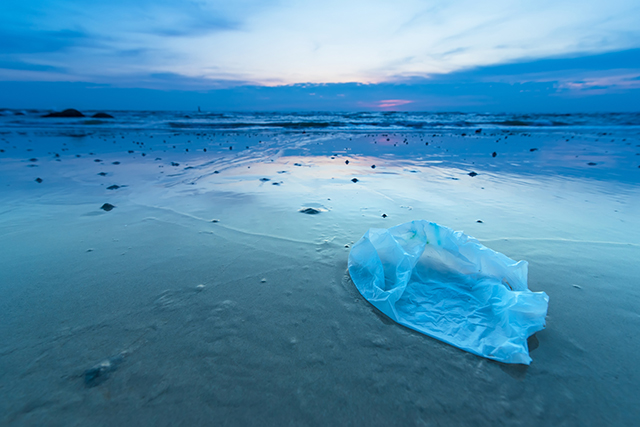
Truthout is a vital news source and a living history of political struggle. If you think our work is valuable, support us with a donation of any size.
Nearly three-quarters of deep-sea fish collected from the northern Atlantic Ocean by an Irish research team were found to have tiny particles of plastic in their guts, suggesting that human-made plastic pollution is penetrating deeper into marine ecosystems than previously thought, according to a report published Monday.
Scientists at the National University of Ireland collected 233 fish specimens from a warm, circular current in the northwest Atlantic known as a “warm core eddy” and found that 73 percent had digested tiny plastic particles called “microplastics.” These are pieces of plastic less than 5 millimeters long, or smaller than a sesame seed. They come from synthetic clothing, skin cleansers containing “microbeads” and larger pieces of plastic bags, bottles and other debris that slowly break down in the environment.
Warm core eddies are known to accumulate plastic pollution, which may explain why the team found one of the highest rates of microplastic contamination ever recorded in fish. Plastics are the most prevalent type of pollution found in the world’s oceans, as well the Great Lakes in the United States, according to the US National Ocean and Atmospheric Association.
Microplastic pollution can be passed on from prey to predator through the food chain.
The Irish researchers crossed the Atlantic in a research vessel and collected several species of deep-water fish with large fishing nets from a depth of about 600 meters, or about 2,000 feet below the surface. The specimens were brought back to labs in Galway, Ireland, where the researchers inspected their stomach contents for microplastics. The most common contaminants were tiny plastic fibers colored blue or black.
One spotted lanternfish, measuring less than two inches in length, was found to have 13 microplastic bits in its stomach, according to a press release.
“Indeed, it’s worrying to think that our daily activities, such as washing our synthetic clothes in our washing machines, results in billions of microplastics entering our oceans through our waste water stream that may eventually end up in these deep-sea fishes,” report co-author Tom Doyle said in a statement.
Previous studies have shown plankton, worms and small fish ingest microplastics, which can cause internal physical damage to their digestive systems, according to the report. Since animals do not easily digest plastics, microplastic pollution can be passed on from prey to predator through the food chain.
Microplastics — along with toxic additives to plastic products such as colorants and flame retardants — could even contaminate larger fish species such as swordfish and tuna that are consumed by humans, making them a potential threat to human health, according the report.
The study highlights that these seemingly remote fishes in our ocean are not isolated from our pollution.
“While there is clearly a concern that the ingestion of microplastics with associated toxins may have harmful effects on these fishes, or even the fishes that feed on them, our study highlights that these seemingly remote fishes located thousands of kilometers from land and 600 meters down in our ocean are not isolated from our pollution,” Doyle said.
After decades of litter and trash dumping, human-made plastic pollution has been found in some of the most isolated marine environments in the world, including ice floes in the central Arctic Ocean only 1,000 miles from the North Pole. Plastics tend to be less dense than water and float on the surface, but the Irish study suggests that microplastics can penetrate deep into the ocean as they make their way through the food chain.
“Deep-water fish migrate to the surface at night to feed on plankton … and this is likely when they are exposed to the microplastics,” said Alina Wieczorek, the lead author of the study.
The US and several European countries have banned the use of microbeads in cosmetic products, but throwaway plastic products remain ubiquitous across the globe. Meanwhile, the petroleum industry is increasingly looking to plastics production to maintain demand for oil as certain countries promote cleaner alternatives to climate-disrupting fossil fuels.
If current consumption trends continue, the plastics industry would consume 20 percent of petroleum produced on Earth by 2050, according to a 2016 report published by the World Economic Forum. By then, the amount of plastic in the world’s ocean would outweigh the entire mass of fish still living in them.
A terrifying moment. We appeal for your support.
In the last weeks, we have witnessed an authoritarian assault on communities in Minnesota and across the nation.
The need for truthful, grassroots reporting is urgent at this cataclysmic historical moment. Yet, Trump-aligned billionaires and other allies have taken over many legacy media outlets — the culmination of a decades-long campaign to place control of the narrative into the hands of the political right.
We refuse to let Trump’s blatant propaganda machine go unchecked. Untethered to corporate ownership or advertisers, Truthout remains fearless in our reporting and our determination to use journalism as a tool for justice.
But we need your help just to fund our basic expenses. Over 80 percent of Truthout’s funding comes from small individual donations from our community of readers, and over a third of our total budget is supported by recurring monthly donors.
Truthout has launched a fundraiser to add 500 new monthly donors in the next 9 days. Whether you can make a small monthly donation or a larger one-time gift, Truthout only works with your support.